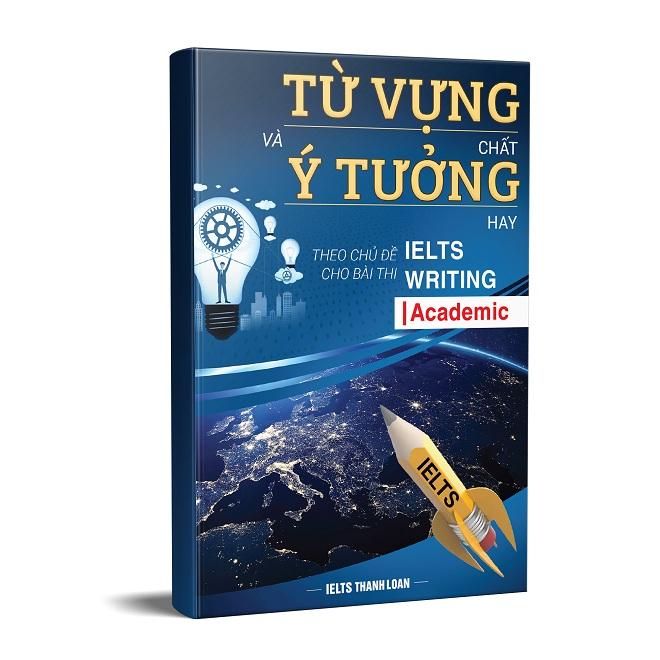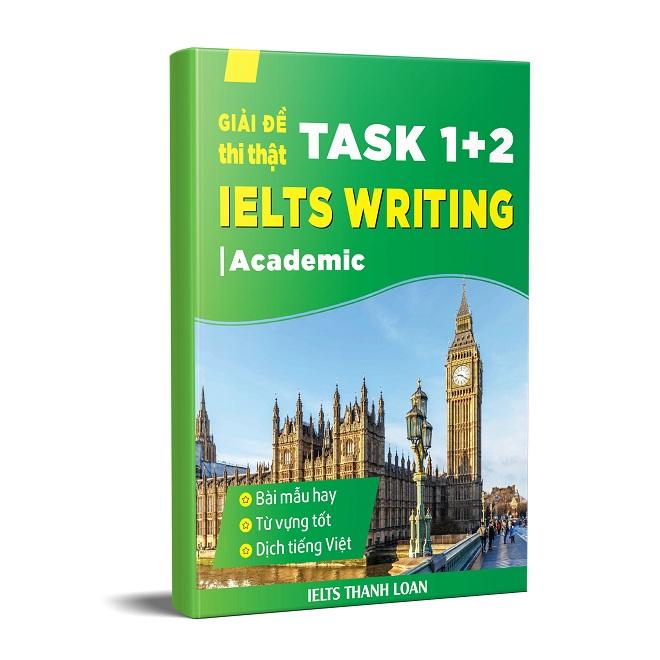Một trong những mối quan tâm lớn trong đời sống hiện đại là về Môi trường & năng lượng – Environment & Energy. Chính vì thế, chủ đề này cũng xuất hiện khá nhiều trong Writing Task 2.
Tuy nhiên, từ chủ đề lớn trên, mỗi câu hỏi trong Writing Task 2 lại chỉ tập trung vào một chủ đề nhỏ (được gọi là sub-topics), ví dụ như:
- responsibilities of governments in environmental protection
- responsibilities of individuals in environmental protection
Trong bài viết này, IELTS Thanh Loan xin gợi ý với bạn những ý tưởng thông dụng nhất về 2 sub-topics, đó là: “pollution” và “alternative energy”.
Gợi ý sách liên quan
Từ vựng chất và ý tưởng hay theo chủ đề cho bài thi IELTS Writing
Với các chủ đề nhỏ còn lại, hãy tham khảo cuốn sách này được biên soạn bởi đội ngũ IELTS Thanh Loan để không bao giờ bí ý, bí từ khi viết bài.

I. POLLUTION
1. Causes
a. Air pollution
The first cause of air pollution is the combustion of fossil fuels that drives the industrial process.
(Nguyên nhân đầu tiên của ô nhiễm không khí đó chính là việc đốt cháy nhiên liệu hóa thạch trong quá trình công nghiệp.)
Another cause of air pollution is common forms of transportation like automobiles, planes, and ships which generally use combustion to harness energy from fossil fuel.
(Nguyên nhân khác của ô nhiễm không khí là các loại hình giao thông vận tải như ô tô, máy bay và tàu sử dụng quá trình đốt cháy để tạo ra năng lượng từ nhiên liệu hóa thạch.)
However, air pollution is not entirely man-made/artificial. In fact, natural processes such as volcano eruptions also release a lot of toxic substances (sulfur dioxide) into the air.
(Tuy nhiên ô nhiễm không khí không hoàn toàn do con người gây ra. Trên thực tế, các quá trình tự nhiên như việc núi lửa phun trào cũng tạo ra rất nhiều các chất độc hại (khí SO2) vào trong không khí.)
b. Soil pollution
The main culprit of soil pollution is agricultural farming activities. To have a high crop yield, farmers utilize modern pesticides and fertilizers, which are full of chemicals not produced in nature and cannot be broken down. As a result, they seep into the ground and reduce the fertility of the soil.
(Nguyên nhân chính của ô nhiễm đất đó chính là do các hoạt động canh tác nông nghiệp. Để có được một vụ mùa năng suất cao, nông dân sử dụng phân bón và thuốc trừ sâu hiện đại đầy những chất hóa học không được tạo ra trong tự nhiên và vì thế không thể phân hủy được. Do vậy, các chất này ngấm vào trong đất và làm giảm độ màu mỡ của đất.)
Another culprit of soil pollution is waste disposal. Both industry and households are contributors to the increasing amount of waste dumped into the environment.
(Một nguyên nhân khác của ô nhiễm đất đó chính là việc xả rác. Cả công nghiệp và các hộ gia đình là nguyên nhân chính dẫn đến lượng rác bị vứt vào môi trường ngày càng tăng.)
The final culprit of soil pollution is acid rain, in which contaminated water could dissolve some of the important nutrients in the soil and change the structure of the soil.
(Nguyên nhân cuối cùng đó là do mưa axit khi mà nước bị nhiễm độc có thể làm tan các chất dinh dưỡng quan trọng trong đất và thay đổi cấu trúc của đất.)
c. Water pollution
The first cause of water contamination in many developed communities is due to wastewater and sewage dumped straight into the sea or river. Even though they are treated, they are never the same as freshwater.
(Nguyên nhân đầu tiên của việc ô nhiễm nguồn nước ở các quốc gia phát triển đó chính là nước thải bị đổ trực tiếp ra sông hoặc biển. Thậm chí ngay cả khi nước thải đã được xử lý, loại nước này cũng không bao giờ giống với nước sạch ban đầu được.)
Another cause of water pollution is oil leakage. Many liquid products (like oil or petroleum) are stored in metal and steel tubes underground, which may over time rust and begin to leak, ending up contaminating many nearby water bodies.
(Một nguyên nhân khác của ô nhiễm nước đó chính là việc rò rỉ dầu. Rất nhiều sản phẩm lỏng như dầu hay xăng được lưu trữ ở trong các ống thép hay kim loại dưới lòng đất và qua thời gian những ống này có thể bị rỉ và bắt đầu bị rò rỉ, gây nhiễm độc cho rất nhiều nguồn nước xung quanh.)
2. Consequences
The first effect of environmental pollution is environmental degradation. For example, water pollution in terms of oil spills may lead to the death of several wildlife species. Moreover, the increasing amount of smog emitted into the air through industrial processes and transportation may prevent plants from the process of photosynthesis.
(Hậu quả đầu tiên của ô nhiêm môi trường đó là gây ra suy thoái môi trường. Ví dụ, ô nhiễm nước do tràn dầu có thể dẫn đến việc các loài động vật hoang dã bị chết đi. Hơn nữa, lượng khí thải thải ra không khí qua quá trình công nghiệp và vận tải có thể cản trở thực vật trong quá trình quang hợp.)
The second adverse effect of pollution is on human health. For example, the decrease in air quality leads to several respiratory problems including asthma or lung cancer. Moreover, water pollution may pose skin-related problems such as skin irritation and rashes.
(Ảnh hưởng thứ hai của ô nhiễm đó chính là những tác động tiêu cực lên sức khỏe của con người. Ví dụ, sự suy giảm chất lượng không khí sẽ dẫn đến các bệnh về đường hô hấp như bệnh hen suyễn hay ung thư phổi. Hơn nữa, ô nhiễm nước cũng sẽ gây ra những bệnh về da như phát ban hay ngứa da.)
The third effect of pollution is that the emission of greenhouse gases particularly CO2 can lead to global warming. This causes the melting of polar ice caps, increasing sea level and posing danger for people living in coastal areas.
(Ảnh hưởng thứ ba của ô nhiễm là khí nhà kính, đặc biệt là khí CO2, có thể gây nóng lên toàn cầu. Việc này sẽ làm băng ở các cực tan chảy, làm tăng mực nước biển và đem lại những mối nguy hại cho người dân sống ở vùng ven biển.)
3. Solutions
The first measure to mitigate the problems of pollution is to encourage people to use more public modes of transportation.
(Giải pháp đầu tiên để giải quyết vấn đề ô nhiễm đó chính là khuyến khích mọi người sử dụng phương tiện công cộng nhiều hơn nữa.)
Secondly, a large amount of fossil fuel is burned to generate electricity, so you can save the environment by reducing the amount of power wasted. For example, it is more environmentally friendly to use energy-efficient devices that consume less electricity.
(Thứ hai, một lượng lớn nhiên liệu hóa thạch bị đốt cháy để tạo ra điện, vì vậy bạn có thể bảo vệ mội trường bằng việc giảm lượng năng lượng bị lãng phí. Ví dụ, sẽ thân thiện với môi trường hơn khi sử dụng các thiết bị tiết kiệm năng lượng tiêu tốn ít điện hơn.)
Thirdly, people should not get rid of items that are of no use and should reuse them for different purposes.
(Thứ ba, mọi người không nên vứt các đồ vật không dùng đến đi mà nên tái sử dụng chúng cho các mục đích khác nhau.)
VOCABULARY
combustion (noun)
Meaning: the process of burning
Vietnamese: Sự đốt cháy, sự cháy
fossil fuel (compound noun) = natural resources
Meaning: fuel such as coal or oil, that was formed over millions of years from the remains of animals or plants
Vietnamese: Nhiên liệu hóa thạch
automobile (noun) = car
Meaning: a car
Vietnamese: Ô tô
harness (verb)
Meaning: to control and use the force or strength of something to produce power or to achieve something
Vietnamese: Khai thác để sản xuất năng lượng
toxic (adjective)
Meaning: poisonous
Vietnamese: Độc, có độc
agricultural farming activity (noun phrase)
Meaning: the activity related to agriculture
Vietnamese: Hoạt động canh tác nông nghiệp
crop yield (compound noun)
Meaning: the total amount of crop that are produced
Vietnamese: Sản lượng cây trồng
pesticide (noun) = insecticide
Meaning: a chemical used for killing pests, especially insects
Vietnamese: Thuốc trừ sâu
fertilizer (noun)
Meaning: a substance added to soil to make plants grow more successfully
Vietnamese: Phân bón
break down (phrasal verb) = degrade
Meaning: to make a substance separate into parts or change into a different form in a chemical process
Vietnamese: Phân hủy
waste disposal (compound noun)
Meaning: the act of getting rid of waste
Vietnamese: Vứt rác
dump something (verb)
Meaning: get rid of something
Vietnamese: Vứt bỏ cái gì
acid rain (compound noun)
Meaning: rain that contains harmful chemicals from factory gases and that damages trees, crops and buildings
Vietnamese: Mưa axit
dissolve (verb)
Meaning: to mix with a liquid and become part of it
Vietnamese: Hòa tan, tan ra
contaminate (verb) = pollute / contamination = pollution (noun)
Meaning: pollute
Vietnamese: Ô nhiễm, làm bẩn
sewage (noun) = wastewater
Meaning: used water and waste substances that are produced by human bodies, that are carried away from houses and factories through special pipes
Vietnamese: Nước thải hay chất thải do con người thải ra
treat (verb)
Meaning: to use a chemical substance or process to clean, protect, preserve, etc. something
Vietnamese: Xử lý (rác thải)
leak (verb)
Meaning: to get in or out through a small hole or crack in something
Vietnamese: Rò rỉ
water body (compound noun)
Meaning: the places that contain a large amount of water
Vietnamese: Nơi chứa khối lượng nước lớn
environmental degradation (noun phrase)
Meaning: the process in which the environment becomes damaged
Vietnamese: Sự xuống cấp của môi trường
oil spill (compound noun)
Meaning: an act when oil leaking out a container
Vietnamese: Tràn dầu, rò rỉ dầu
smog (noun)
Meaning: a form of air pollution that is or looks like a mixture of smoke and fog, especially in cities
Vietnamese: Hỗn hợp khói và sương
photosynthesis (noun)
Meaning: the process by which green plants turn carbon dioxide and water into food using energy obtained from light from the sun
Vietnamese: Quá trình quang hợp
respiratory (adjective)
Meaning: connected with breathing
Vietnamese: Thuộc về hô hấp
greenhouse gases (compound noun)
Meaning: any of the gases that are thought to cause the greenhouse effect, especially carbon dioxide
Vietnamese: Khí nhà kính
polar ice caps (compound noun)
Meaning: a layer of ice permanently covering parts of the earth, especially around the North and South Poles
Vietnamese: Tảng băng ở cực
environmentally friendly (adjective phrase) = eco-friendly
Meaning: not harming the environment
Vietnamese: Thân thiện với môi trường
energy-efficient device (noun phrase)
Meaning: the device that save energy
Vietnamese: Thiết bị tiết kiệm năng lượng
get rid of something (phrasal verb)
Meaning: to throw something away
Vietnamese: Vứt cái gì đi
SAMPLE QUESTIONS
- Some people think that an international car-free day is an effective way to reduce air pollution. Others think there are more effective ways to do this. Discuss both views and give your own opinion.
- While some people consider global warming to be the most pressing environmental problem which we have at the moment, others believe that deforestation has more devastating impacts on our world. Discuss both views and give your own opinion.
- Global warming is one of the biggest threats to our environment. What causes global warming? What solutions are there to this problem?
- Some people believe that restricting air travel is the only way to prevent air pollution. Do you agree or disagree?
Gợi ý sách liên quan
Giải đề thi thật IELTS Writing Task 1 & 2
Nếu bạn muốn tham khảo các bài mẫu IELTS Writing bám sát với đề thi thật nhất, thuộc những chủ đề thường được hỏi trong IELTS Writing Task 2, sở hữu cuốn này chính là sự lựa chọn tuyệt vời.

II. ALTERNATIVE ENERGY
1. The needs for alternative sources of energy
The first reason why we should switch to using renewable energy sources is the environmental challenges caused by burning fossil fuels to generate energy.
(Lý do đầu tiên tại sao mà chúng ta nên chuyển sang sử dụng nguồn năng lượng thay thế đó chính là do các thách thức môi trường gây ra do đốt nhiên liệu hóa thạch để sản xuất điện)
Another reason why humans need to find alternatives is that fossil fuel itself is not a limitless/ inexhaustible source, in other words, fossil fuel supply is running out while the demand for energy is increasing rapidly.
(Một lý do khác tại sao con người cần phải tìm các giải pháp thay thế đó chính là nhiên liệu hóa thạch không phải là nguồn năng lượng vô tận. Chúng đang dần cạn kiệt trong khi nhu cầu sử dụng năng lượng ngày càng tăng.)
Therefore, renewable energy such as solar energy, wind energy, and water power with much lower impacts on the environment is necessary. We can not only avoid the rising cost of energy bills but also improve our energy security.
(Vì vậy, năng lượng thay thế như năng lượng mặt trời, gió, nước với ít ảnh hưởng lên môi trường hơn là rất cần thiết. Chúng ta không chỉ tránh được việc hóa đơn tiền điện gia tăng mà còn cải thiện được tình hình an ninh nhiên liệu.)
2. Benefits of nuclear power
Firstly, using nuclear power produces fewer greenhouse emissions.
(Thứ nhất, sử dụng năng lượng hạt nhân tạo ra ít khí thải nhà kính hơn.)
Secondly, nuclear power generates very inexpensive electricity.
(Thứ hai, năng lượng hạt nhân tạo ra điện với giá rẻ.)
Thirdly, compared to other alternative sources of energy like wind power or solar energy, which rely heavily on weather conditions, nuclear power is more reliable.
(Thứ ba, so với các nguồn năng lượng thay thế khác như gió hay mặt trời, dựa chủ yếu vào điều kiện thời tiết, thì năng lượng hạt nhân sẽ đáng tin cậy hơn.)
3. Drawbacks of nuclear power
One of the biggest issues of using nuclear power is its environmental impacts in relation to uranium. Mining uranium, the main factor for nuclear power production, is not a clean process.
(Một trong những vấn đề lớn nhất của việc sử dụng năng lượng hạt nhân đó chính là các tác động về môi trường có liên quan đến uranium. Đào uranium để sản xuất năng lượng hạt nhân, thì lại không phải là một quá trình sạch.)
Another shortcoming of nuclear energy is nuclear radiation accidents, which pose great threats to humans and nature.
(Một hạn chế khác của năng lượng hạt nhân đó chính là tai nạn hạt nhân, dẫn đến mối hiểm họa cho cả con người lẫn thiên nhiên.)
Another downside of using nuclear power is that it gives us the power to produce nuclear weapons, which can be the targets of terrorist organizations.
(Một mặt hại khác của năng lượng hạt nhân đó chính là nó cho con người có thêm cơ hội để sản xuất vũ khí hạt nhân, và đây có thể là sẽ là mục tiêu tấn công của các tổ chức khủng bố.)
VOCABULARY
renewable energy source (noun phrase)
Meaning: energy and natural resources that are replaced naturally or controlled carefully and can therefore be used without the risk of finishing it all
Vietnamese: Nguồn năng lượng thay thế
limitless (adjective) = inexhaustible
Meaning: without a limit
Vietnamese: Vô tận
energy security (compound noun)
Meaning: the uninterrupted availability of energy sources at an affordable price”
Vietnamese: An ninh năng lượng
greenhouse emissions = greenhouse gas (compound noun)
Meaning: any of the gases that are thought to cause the greenhouse effect, especially carbon dioxide
Vietnamese: Khí nhà kính
nuclear radiation accident (compound noun)
Meaning: the accident in which radioactivity is released into the atmosphere
Vietnamese: Tai nạn rò rỉ hạt nhân
nuclear weapon (compound noun)
Meaning: the weapon using nuclear
Vietnamese: Vũ khí hạt nhân
terrorist (noun)
Meaning: a person who takes part in terrorism
Vietnamese: Kẻ khủng bố
SAMPLE QUESTIONS
- The government should make more efforts to promote alternative sources of energy. To what extent do you agree or disagree with this opinion?
- Renewable energy, such as solar and wind power, have shown great promise. However, they have often disappointed in practice. What are the advantages and disadvantages of these forms of power generation compared to fossil fuels? In your opinion, which source of energy is better?
- Solar energy is becoming more and more popular as a source of household energy in many countries around the world. Do the advantages of solar energy outweigh the disadvantages?
- The threat of nuclear weapons maintains world peace. Nuclear power provides cheap and clean energy. The benefits of nuclear technology far outweigh the disadvantages. Do you agree or disagree?
Bài viết liên quan:
- Từ vựng và ý tưởng IELTS Writing theo chủ đề – Work/ Jobs
- Từ vựng và ý tưởng IELTS Writing theo chủ đề – Media
- Từ vựng và ý tưởng IELTS Writing theo chủ đề – Tourism
IELTS Thanh Loan – Trung tâm luyện thi IELTS cung cấp các khóa học IELTS Online, sách IELTS:
- ĐT: 0974 824 724
- Email: [email protected]
- Địa chỉ: S103 Vinhomes Smart City, Tây Mỗ, Nam Từ Liêm, Hà Nội













